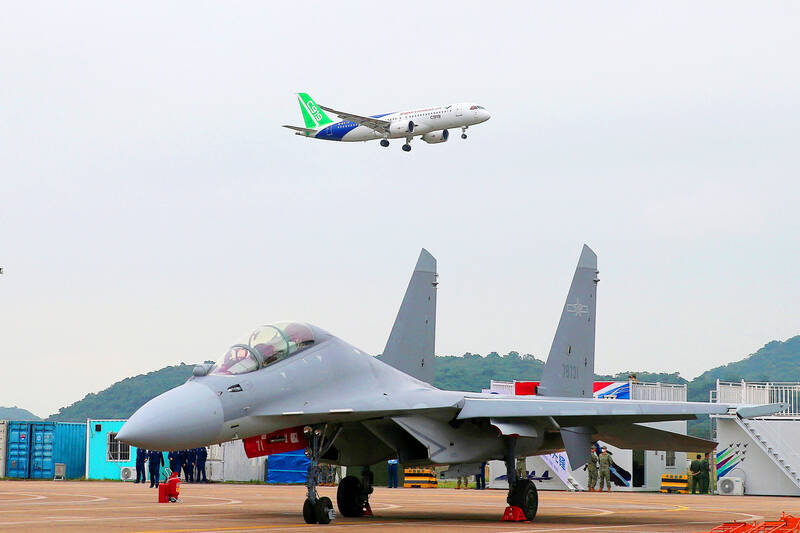Chinese planemaker Commercial Aircraft Corp of China (COMAC, 中國商用飛機) yesterday said it had secured 330 orders for its homegrown C919 narrow-body and ARJ21 regional jets, and raised its 20-year aircraft demand forecast at the country’s biggest air show.
China Development Bank Financial Leasing Co (國銀金融租賃), ICBC Financial Leasing Co (工銀租賃), CMB Financial Leasing Co (招銀金融租賃), Bank of Communications Financial Leasing Co (交銀金融租賃), CCB Financial Leasing Corp (建信金融租賃), SPDB Financial Leasing Co (浦銀金融租賃) and Jiangsu Financial Leasing Co (江蘇金融租賃) on Tuesday signed orders for a combined 300 C919s and 30 ARJ21s at Airshow China in Zhuhai, COMAC said in a statement.
As with previous announcements, it was not immediately clear how many were firm orders or expressions of interest, and no delivery dates were provided.

Photo: Reuters
Before the latest deals, there had been 815 orders for the C919 from 28 customers, COMAC said on its Web site.
China Eastern Airlines Corp (中國東方航空) is the only customer that has announced a firm delivery schedule. It expects to receive its first plane next month and another four next year.
The C919 is China’s rival to the popular Airbus SE A320neo and Boeing Co 737 MAX narrow-body jet families, as China looks to become more self-sufficient.
COMAC on Tuesday said that China would need 9,284 new aircraft over the next 20 years to meet market demand, 200 more than in its forecast last year.
The Chinese planemaker’s forecast is higher than Boeing’s, which last month predicted that China would require 8,485 new planes in the next 20 years.
The US manufacturer forecast China would need 6,370 single-aisle airplanes to support its growing network of international and domestic routes, while COMAC said that 6,896 such planes would be needed.
Boeing has been shut out of orders in the world’s biggest market for new aircraft since 2017 amid US-China trade tensions, although Chinese airlines this year agreed to buy more than 300 Airbus narrow-body planes.

When an apartment comes up for rent in Germany’s big cities, hundreds of prospective tenants often queue down the street to view it, but the acute shortage of affordable housing is getting scant attention ahead of today’s snap general election. “Housing is one of the main problems for people, but nobody talks about it, nobody takes it seriously,” said Andreas Ibel, president of Build Europe, an association representing housing developers. Migration and the sluggish economy top the list of voters’ concerns, but analysts say housing policy fails to break through as returns on investment take time to register, making the

‘SILVER LINING’: Although the news caused TSMC to fall on the local market, an analyst said that as tariffs are not set to go into effect until April, there is still time for negotiations US President Donald Trump on Tuesday said that he would likely impose tariffs on semiconductor, automobile and pharmaceutical imports of about 25 percent, with an announcement coming as soon as April 2 in a move that would represent a dramatic widening of the US leader’s trade war. “I probably will tell you that on April 2, but it’ll be in the neighborhood of 25 percent,” Trump told reporters at his Mar-a-Lago club when asked about his plan for auto tariffs. Asked about similar levies on pharmaceutical drugs and semiconductors, the president said that “it’ll be 25 percent and higher, and it’ll

CHIP BOOM: Revenue for the semiconductor industry is set to reach US$1 trillion by 2032, opening up opportunities for the chip pacakging and testing company, it said ASE Technology Holding Co (日月光投控), the world’s largest provider of outsourced semiconductor assembly and test (OSAT) services, yesterday launched a new advanced manufacturing facility in Penang, Malaysia, aiming to meet growing demand for emerging technologies such as generative artificial intelligence (AI) applications. The US$300 million facility is a critical step in expanding ASE’s global footprint, offering an alternative for customers from the US, Europe, Japan, South Korea and China to assemble and test chips outside of Taiwan amid efforts to diversify supply chains. The plant, the company’s fifth in Malaysia, is part of a strategic expansion plan that would more than triple

Taiwanese artificial intelligence (AI) server makers are expected to make major investments in Texas in May after US President Donald Trump’s first 100 days in office and amid his rising tariff threats, Taiwan Electrical and Electronic Manufacturers’ Association (TEEMA, 台灣電子電機公會) chairman Richard Lee (李詩欽) said yesterday. The association led a delegation of seven AI server manufacturers to Washington, as well as the US states of California, Texas and New Mexico, to discuss land and tax issues, as Taiwanese firms speed up their production plans in the US with many of them seeing Texas as their top option for investment, Lee said. The